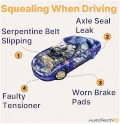
An engine air filter is part of the vehicle's intake system, blocking dust, dirt, and debris, from entering the engine. It protects the combustion chamber, so the air-fuel mixture for combustion stays pure. Of course, the engine air filter gets old and dirty over time, so it needs regular replacement. If the filter gets clogged or damaged, it'll affect fuel efficiency and engine performance.
How often should the engine air filter be changed?
It depends on the manufacturer's recommendations. But, a rule of thumb is to replace it every 12,000 to 15,000 miles (19,000 to 24,000 kilometers). However, if you're constantly driving on dusty areas or dirt roads, that interval might drop down to 6,000 to 8,000 miles (9,600 to 12,800 kilometers). Still, checking the filter's structure for dirtiness or damage needs no interval.
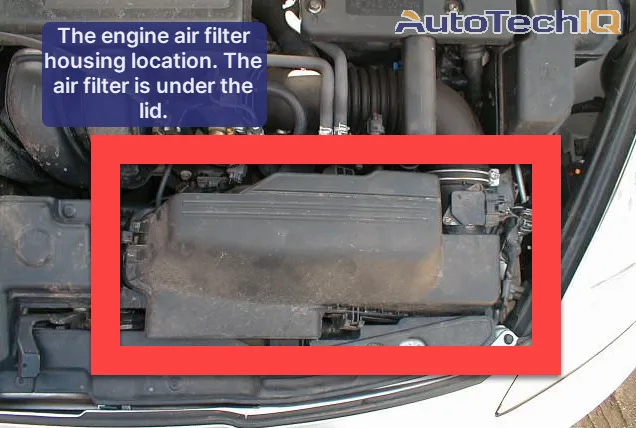
What are the symptoms of a dirty engine air filter?
A dirty engine air filter causes bad engine airflow. So, increased fuel consumption, loss of power, and weak acceleration end up happening. Plus, an engine with bad airflow might make a sucking or wheezing noise. You might also keep an eye open for poor throttle response, a rough idle, or the check engine light on the dashboard; they might relate to an issue with the engine air filter.
What does a dirty engine filter look like?
It looks brownish, filled with leaves, dirt, and crinkly; basically what a dirty A/C air filter would look like. A damaged one might have tears or holes in the filter material. A clean filter, by contrast, is usually white or off-white.
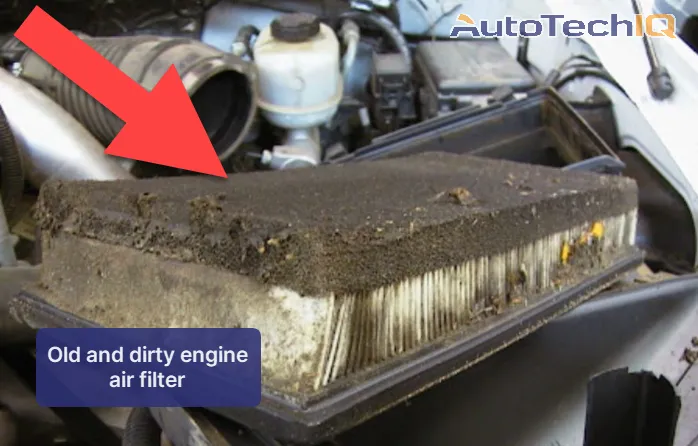
Can you drive with a dirty engine air filter?
Yes, at least for a long while. But, keep in mind, the bad airflow will start slowly damaging your engine. The engine's combustion process will get contaminated. Finally, your vehicle will show serious damage after a while. The fuel efficiency, emissions, and engine performance will slowly worsen until your vehicle simply stops running, in more extreme cases.
Can a dirty air filter cause engine failure?
A dirty air filter can trigger a snowball effect that ends up in total engine failure. A clogged air filter equals bad airflow, which also equals poor engine performance, increased fuel consumption, and internal damage from dirt passing through the filter. So, if the airflow doesn't improve for a long while, the engine takes in dirt, slowly weakening until it fails.
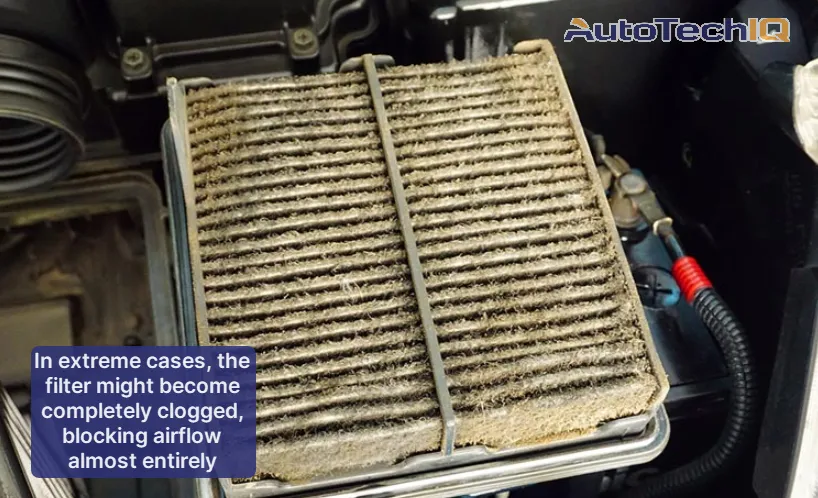
The most common symptoms of a dirty engine filter
Reduced Acceleration and Power
A dirty air filter results in bad air intake in the combustion chamber. This restriction worsens the ideal air-to-fuel ratio, resulting in bad combustion. Consequently, the engine loses power and acceleration.
Increased Fuel Consumption
A dirty air filter reduces the volume of air entering the engine, interrupting the air-fuel mixture. The engine injects more fuel than needed to compensate for this bad mixture, increasing the fuel consumption.
Unusual Engine Sounds
A bad airflow can cause noises like sucking or wheezing. These sounds show something is blocking the air intake process, pointing to a badly clogged engine air filter.
Poor Throttle Response
A dirty air filter causes bad airflow, resulting in a slow or unresponsive throttle. This is because of the engine's bad fuel delivery in response to throttle input.
Rough Idle
A dirty air filter makes the engine unstable by blocking the airflow in the combustion chamber. This interrupts combustion cycles, making the engine run weirdly at idle. Consequently, you might notice vibrations and more noises.
Check Engine Light
A bad air filter can trigger the check engine light. This happens because, in extreme cases, the engine parameters go crazy with bad airflow, making the onboard diagnostics system send a warning.
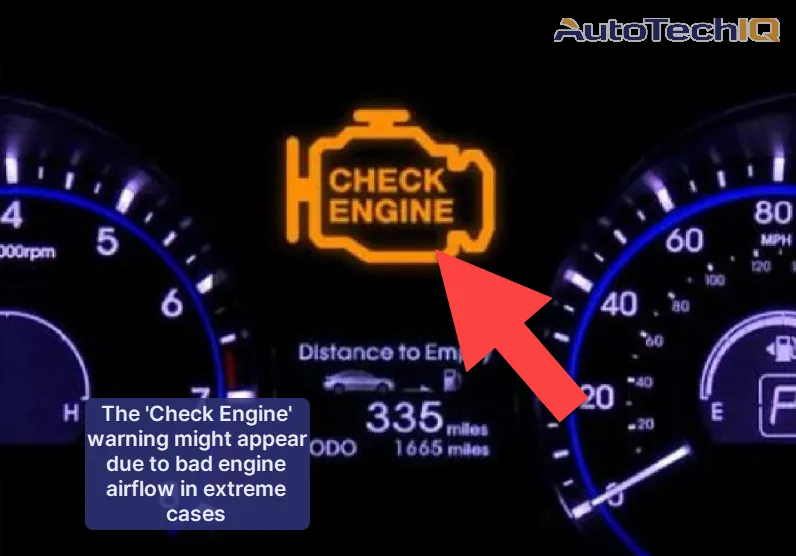
How good shops service an engine air filter
Experienced technicians make it a journey of educating a car owner on every service. In this case, a class-act shop would go through the importance of engine air filter replacement and maintenance.
Inspect: Emily, an expert technician started inspecting Mr. Anderson's vehicle. The reason for the appointment was that Mr. Anderson's car got slower than usual and made some odd sounds. Emily inspected the car and found a dirty and old engine air filter.
Test: Moving to the testing phase, the technician used a scan tool and gauges. The mechanic observes real-time measurements, noticing how the filter is affecting engine performance. Emily carefully points to areas with dirt and wear signs on the filter, explaining them to Mr. Anderson.
Evaluate: Then, with images and test results, Emily evaluates the best course of action. She shares her notes with Mr. Anderson, discussing what she thinks works best.
Diagnose: After setting a diagnosis, they plan for a repair method. Emily shows comparison videos and images of new engine air filters with old ones. The images and Emily's explanations help Mr. Anderson understand that replacing his air filter would be ideal.
Confirm Repair: After Mr. Anderson agrees with the repair proposal, Emily replaces the engine air filter. Then, she invites Mr. Anderson to verify if all the symptoms he complained about initially went away. After confirming through a final test, the service is complete.
The most common causes of an engine air filter problem
Dirty Air Filter
Accumulation of dirt and debris in the air filter restricts airflow, disrupting the air-fuel mixture.
Air Filter Damage
The air filter might be developing tears due to a lack of maintenance. These types of tears get more serious over time. The best way to avoid this is to ask a shop to quickly check the air filter during any inspection.
Air Filter Housing Damage
The engine air filter sits inside a housing under the vehicle's hood. This air filter box's material is plastic and can crack just like any plastic container. A crack in the engine air filter housing allows extra dust and debris to reach the air filter.
Poor Quality or Incorrect Filter
Your car has a filter brand/model that'll suit it better; consult your mechanic to get his recommendation. Plus, some filters are cheaper than others and don't last as long. In such cases, you might find yourself having to change air filters more regularly.
Weather Conditions
Driving in extreme weather conditions like scolding hot or freezing cold can affect your engine air filter. In the heat, the filter's material might break down more easily, while in the cold it can cause moisture to freeze and block airflow.
Top 5 fixes for engine air filter problems
Replace Air Filter: Restores optimal airflow, ensuring the engine receives clean air for efficient combustion, improving performance, and fuel efficiency.
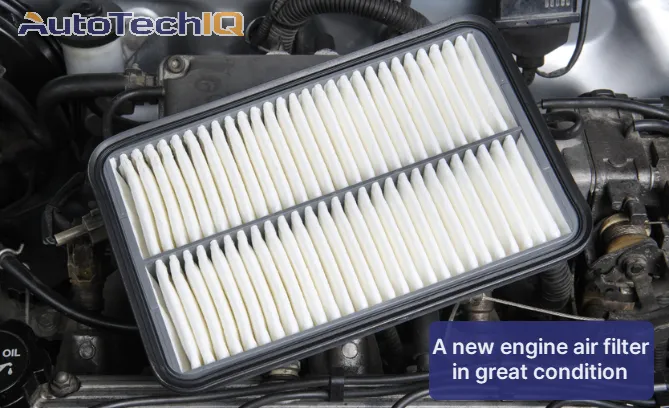
Scheduled Cleaning & Maintenance: If you have a maintenance schedule, make sure to include an engine air filter check in it. If you don't have a maintenance schedule, you'd do good by planning one to avoid unexpected issues from developing.
Air Filter Housing Replacement: Oftentimes, the air filter housing can develop cracks that allow particles to sneak in. In these cases, the particles might be contaminating the air filter and degrading it faster. So, replacing or fixing the air filter housing might be needed.
Choosing Good Filters: Make sure your vehicle gets the air filter that's best for it. Take note of the filter's brand, model, and material quality; ask your mechanic for his recommendation.
Prepare For Extreme Weather: If you're driving during an extremely cold or hot season, prepare your vehicle. This includes checking the air filter's condition more regularly or even getting a new one before the season starts.
Summary
A comprehensive guide sheds light on common car troubles and effective solutions. From the impact of a dirty air filter on engine power to diagnosing faulty oxygen sensors, the article navigates through top causes and fixes. Learn the art of visual inspection using diagnostic images and understand the language of your engine. Whether it's replacing a clogged air filter or addressing ignition system quirks, this guide empowers car owners with the knowledge to keep their vehicles running smoothly.
There's an auto shop near you delivering fair, transparent service like you've read here.
Feel free to visit our 'Shop Near You' page and search for our certified repair shops in your area. These businesses provide top-notch services and expert inspections using advanced diagnostic tools. You'll witness the same level of care and attention to detail highlighted in this article. These shops share our goal of ensuring your vehicle receives the best possible maintenance. At this goal's core, your knowledge of what's happening to your car and how to maintain it is our #1 priority.
